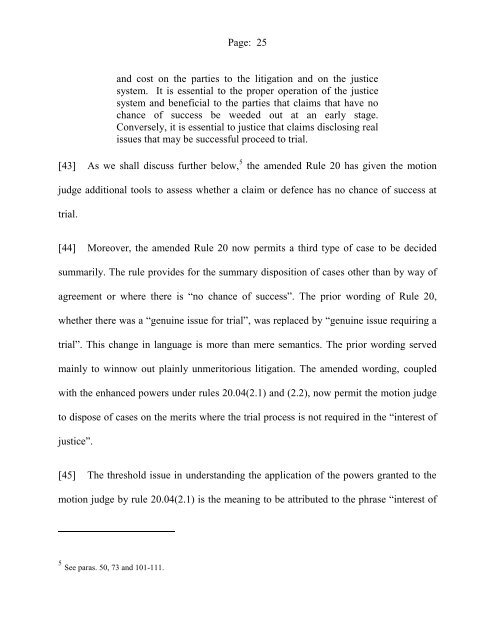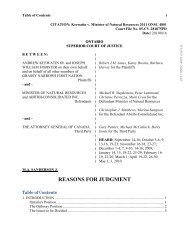COURT OF APPEAL FOR ONTARIO
COURT OF APPEAL FOR ONTARIO
COURT OF APPEAL FOR ONTARIO
You also want an ePaper? Increase the reach of your titles
YUMPU automatically turns print PDFs into web optimized ePapers that Google loves.
Page: 25<br />
and cost on the parties to the litigation and on the justice<br />
system. It is essential to the proper operation of the justice<br />
system and beneficial to the parties that claims that have no<br />
chance of success be weeded out at an early stage.<br />
Conversely, it is essential to justice that claims disclosing real<br />
issues that may be successful proceed to trial.<br />
[43] As we shall discuss further below, 5 the amended Rule 20 has given the motion<br />
judge additional tools to assess whether a claim or defence has no chance of success at<br />
trial.<br />
[44] Moreover, the amended Rule 20 now permits a third type of case to be decided<br />
summarily. The rule provides for the summary disposition of cases other than by way of<br />
agreement or where there is “no chance of success”. The prior wording of Rule 20,<br />
whether there was a “genuine issue for trial”, was replaced by “genuine issue requiring a<br />
trial”. This change in language is more than mere semantics. The prior wording served<br />
mainly to winnow out plainly unmeritorious litigation. The amended wording, coupled<br />
with the enhanced powers under rules 20.04(2.1) and (2.2), now permit the motion judge<br />
to dispose of cases on the merits where the trial process is not required in the “interest of<br />
justice”.<br />
[45] The threshold issue in understanding the application of the powers granted to the<br />
motion judge by rule 20.04(2.1) is the meaning to be attributed to the phrase “interest of<br />
5 See paras. 50, 73 and 101-111.
















